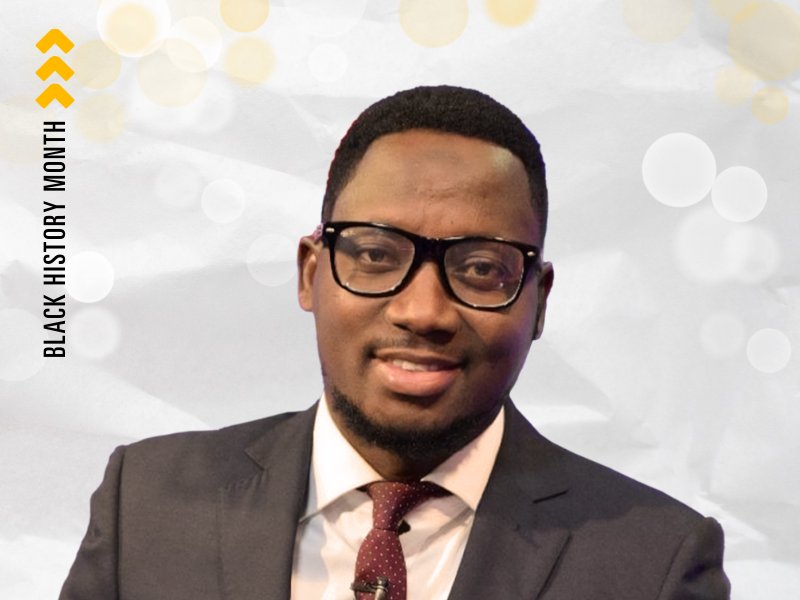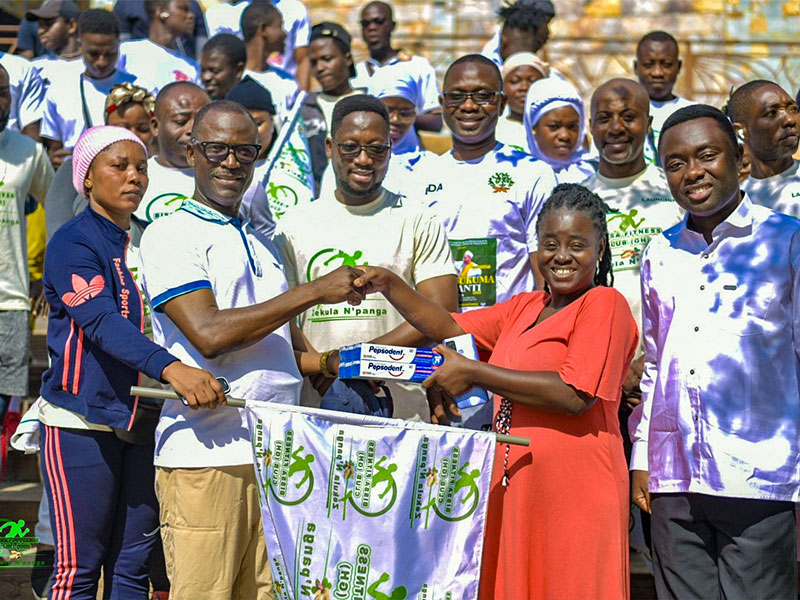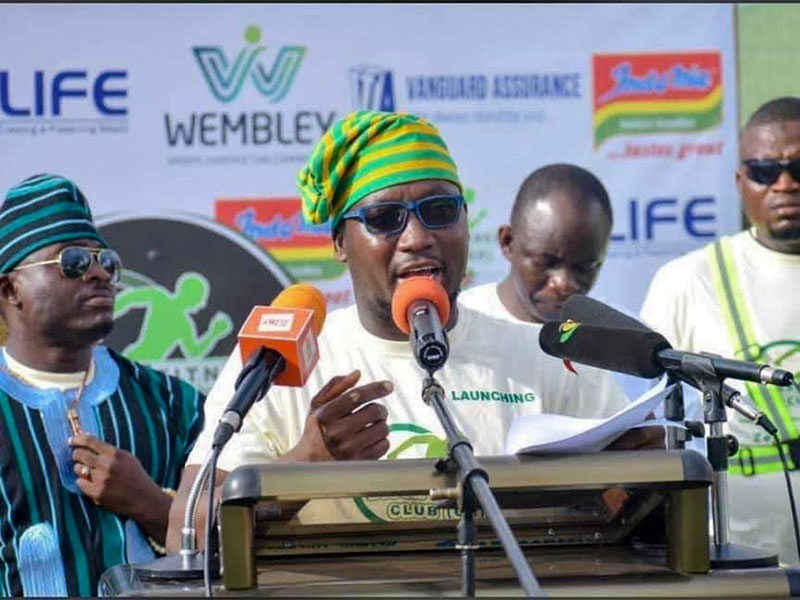Black History Month Leading Voices: Hussein Alhassan Leads Beyond Borders

Author: Megan Nash
From a suburb in West Africa, Hussein Alhassan’s story is one of humble beginnings. Born into a modest community in Madina, Ghana, Alhassan was on a mission to redefine his story, breaking barriers as the first in his family to study abroad. During an interview for VCU Business’ “Leading Voices” initiative in honor of Black History Month, Alhassan shared a story that took an inspiring turn as he made headlines both in his hometown and at Virginia Commonwealth University.
Before his academic pursuits, sports were Alhassan’s constant companions. From the pitch to giving the play-by-play in his community, he found solace and joy in the world of sports commentary. “I loved how commentators got into their job,” he recalled, “and I thought, ‘this is fun. I want to do this.’”
His passion for sports intertwined with his academic journey, leading him to enroll in business school and landing internships in media where a broader horizon was revealed. A role at the University of Professional Studies became the launchpad for a new venture – a training program for sport industry professionals that garnered national acclaim. His journey took him to global stages, speaking at prestigious events like the World Football Summit and the AfroSport Summit. Along the way, he rose to become one of Ghana’s top sport anchors, earning nominations and accolades.

However, Alhassan’s aspirations extended beyond the limelight of commentary. In a twist of fate, a Google search connected Alhassan with the VCU Center for Sport Leadership (CSL). Dr. Carrie LeCrom, executive director of the CSL, entered the scene, and Alhassan saw the pieces fall into place. At the time of their initial connection, LeCrom was, serendipitously, coordinating a sports diplomacy exchange to Ghana as part of a U.S. Department of State grant she manages. As a result, Alhassan and LeCrom were able to meet in person, in Accra, Ghana, as he was applying to the program.
Now a graduate student at the CSL, a new opportunity presented itself to give back to the community that molded him. Aware of his plans to return to Ghana, Dr. LeCrom initiated a collaboration to donate sports equipment. The result: a heartfelt contribution to a youth soccer organization, Top Ten Academy.
From Madina to global platforms, Alhassan has not only reshaped his narrative but also leaves a compelling trail for others to follow. Read on to hear his thoughts on Black history and what inspires leadership – no matter what corner of the world you come from.

What does leadership mean to you?
Leadership to me is influence, and influence is the ability to affect someone or affect people by making a difference in what they think.
A big difference could be changing someone’s status. For instance, the Top Ten Academy and other organizations that I’ve had the opportunity to work with. For me, leadership is the ability to change something when you have the opportunity.
Making the donation to the Top Ten Academy certainly is going to impact a lot on the kids. It will not only help them in their journey to become future soccer professionals, which is something a lot of them want to do, but for those who would fall along the way. My story, where I come from, what I’ve been able to do and where I’ve gotten to, would serve as motivation for them that they can achieve whatever they want, regardless of where they are coming from.
That’s what leadership means to me – the ability to change someone’s perception, to change someone’s situation and make them into better people.

How might initiatives like your donation to the Top Ten Academy contribute to leadership development among youth involved in sports programs?
Initiatives such as the Top Ten Academy only serve to motivate.
People who are into sports take that opportunity to help grow or develop others and in doing so, for instance, if these kids who play for the Top Ten Academy are successful in their journey to become professionals, they always will give back to the community from which they benefited from.
I think those that are involved in sports would agree that it’s one of the easiest vehicles that can be used to impact others around you. If you can propel yourself from an organization or a club and become something great in the future, you owe it to yourself to be able develop those who are coming through behind you.
In addition to supporting the Top Ten Academy, back in Ghana, I am the president of a fitness club called Bissa Fitness Club. This fitness club is all about giving back to communities.
It’s a fitness club purposefully set up to bring groups of young people from my hometown and community together, and we don’t just limit it to my central community. In 2020 for instance, we did a donation to a Christian orphanage in a place called Aburi in Ghana. We do a yearly walk and afterwards, we do a donation. We’ve also helped secure jobs for those unemployed.
Young individuals learn valuable skills such as teamwork and community engagement but also instills a sense of social responsibility to make a positive impact within their communities.

What’s the most important skill for future leaders to have?
The most important skill for future leaders … this is a lesson from Dr. LeCrom’s, leadership class and to me it is adaptability.
I cannot emphasize enough on the importance of adaptability, especially in our current world. If you look back at what has happened from 2019 to 2024, the biggest skill to have would be adaptability because we’ve had to change so many things about us to fit in and be able to survive. If you are not adaptable, if you are unable to adapt to situations, you would get stuck.
From COVID all the way to the emergence of AI, which is taking the world by storm, we all need to adapt in our in our various roles. So, my biggest advice or suggestion to people regarding leadership – one key word: adaptability.
Coming from Ghana, for instance, I grew up in a completely different culture. What I have found in the United States, it requires me to adapt. If I am unable to adapt, I cannot fit in.

What do effective leaders do really well?
I think leaving a legacy is one effective thing that I measure from a leader.
If you are a leader and you’re unable to leave a legacy, it raises a lot of questions about your ability as a leader and it doesn’t necessarily need to come from leading at the forefront. You could do that from whatever position or situation you find yourself in, but the most important thing is leaving a legacy.
People need to look back and say, “wow.” it needs to be something that people can make a reference to, and it recalls for me Ghana’s first president, Kwame Nkrumah. He led Ghana to attain independence from the British in 1957. He’s long gone, but still to this date we still take inspiration from what he had been able to do – attaining independence for Ghana while risking his life.
When Ghana was liberated, Nkrumah made a landmark speech saying that the independence of Ghana is meaningless unless it is linked up to the total liberation of the African continent. He continued to see through in making many other African countries attain independence. Nigeria was one of those countries, Senegal, all those countries attained independence around 1960 and it was the influence of Nkrumah.
Beyond gaining independence for Ghana from Britain, at the time beyond that, what I thought was a great legacy was the fact that he made key statements about the contribution of Black people to the world.
Nkrumah thought that Black people should be given an opportunity to also help grow the world for the benefit of humankind. He felt that at the time, Black people were not getting enough opportunities and Dr. Martin Luther King, Jr. was in Ghana for the independence celebration in 1957 and I believe it had influence on the civil rights movement.
If I can relate this to a current situation at the CSL. From what I have observed over the last seven months at the CSL, what Dr. LeCrom and the entire team is doing is really fantastic and I know that if in another 20 years we’re talking about people that have left a legacy, that certainly would be something to point out. Dr. LeCrom and her team at the CSL are leaving a legacy. That for me is effective leadership and what it must be about.

We’re curious to know what comes next – tell us what happens after graduation!
To be honest, I’ve got a lot of things on my mind. I haven’t been able to pin down one thing yet.
I am thinking about working in pro sports at the highest level and what I mean by the highest level is say, the governing body of soccer which would be FIFA. I don’t know if it’s going to be mid-year, but I feel like I have a lot to give back to people. When I was an instructor back in Ghana, I wanted to be a professor so that’s also a possibility. I’m waiting to see how things play out.

See how CSL students are redefining sports leadership.
Categories News